Introduction
On December 14, 2020, the Communist Party of China inaugurated several 法治反邪教主题公园 ("Rule of Law And Anti-Heterodox Teachings Recreational Parks,") at Qiantang New District in Hangzhou, in a bid to "form a strong atmosphere of consciously resisting the harm of 邪教 [xie jiao, or "heterodox teachings"][1] and upholding the rule of law."[2] Often incorrectly translated as "cult" or "evil cults," xie jiao is a term used to describe heterodox teachings as far back as the Ming Dynasty (1368-1644).
While the persecution of religious groups began with the establishment of the People's Republic of China's (PRC) in 1949, the central government has never banned religion altogether and its practice by citizens was legally enshrined in the various constitutions.[3] According to official reports, over 13 million people were persecuted in the 1950s campaign against 反动会道门 (fǎndòng huìdàomén or "reactionary secret societies").

Resolutely Suppress the Reactionary Secret Societies," Hu Su, 1951 (source: Chineseposter.net)
The term xie jiao, used to label illegal religious groups, resurfaced in the early 1990s, when eschatological cults overseas, such as Japan's Aum Shinrikyo or the millenarian Branch Davidians from Texas, gained international notoriety for their involvement in high-profile violent incidents. The 1995 list of xie jiao has expanded the definition to include targeted groups of faith operating in China, hence blurring the line between "evil cults" and "heretical teachings" (including groups that are deemed a threat to social stability).[4] During this decade, government-led persecution of new religious movements or self-cultivating spiritual groups intensified, culminating in July 1999 in a full-scale crackdown against the Falun Gong, a new religious movement founded in the 1990s that is now declared xie jiao.
Hangzhou's Rule of Law And Anti-Heterodox Teachings Recreational Parks is a new twist on China's long-running anti-cult campaign, complementing at least five similar "recreational parks" launched in 2020 and concurrent digital campaigns. What are basically public parks with generic lawns, sitting areas, walking trails, and pagoda-shaped gazebos have been retrofitted with large posters, LCD screens and warning signs cautioning visiting visitors about the dangers of xie jiao and teaching them about the "rule of law."
The parks aim to "expose the hypocrisy of xie jiao, crush the breeding ground of the xie jiao virus with the power of the rule of law, and strengthen the anti-xie jiao antibodies of the residents," [5] according to the China Anti-Xie jiao Network, a website run by the Ministry of Public Security. The opening of the recreational park in Hangzhou was officiated by local Chinese Communist Party (CCP) officials and is intended "to promote anti-xie jiao propaganda"[6] at the "grass-roots level"[7] (See APPENDIX I – Another Rule Of Law And Anti-Xie Jiao Recreational Park Was Built In Qiantang New District, Zhejiang Province, Chinafxj.cn, December 17, 2020).
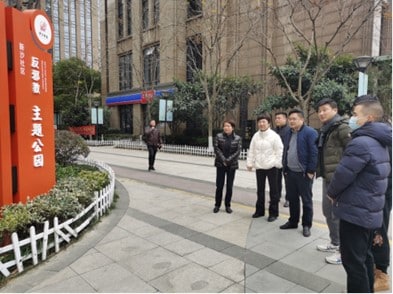
Qiantang New District Anti-Xie Jiao Recreational Park (Source: China Anti-Xie Jiao Network)

Qiantang New District Anti-Xie Jiao Recreational Park (Source: China Anti-Xie Jiao Network)
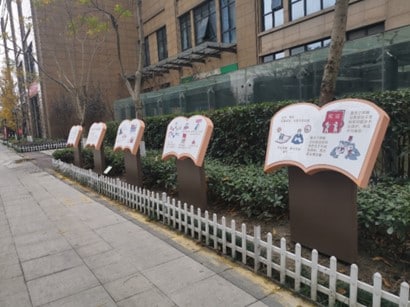
Qiantang New District Anti-Xie Jiao Recreational Park (Source: China Anti-Xie Jiao Network)

Qiantang New District Anti-Xie Jiao Recreational Park (Source: China Anti-Xie Jiao Network)
Recreational Parks Open Across China
In recent years, China has accelerated the development of anti-xie jiao recreational parks in an attempt to mobilise Chinese citizens against unauthorised religious activity. With the goal of preventing people from adhering to xie jiao, two anti-xie jiao recreational parks were opened in Zhejiang in 2014,[8] followed by another in the same province in 2015.[9] In 2016 Jiangsu province welcomed its first anti-xie jiao recreational park.[10] The pace of construction then rapidly increased, completing six recreational parks in 2017 across various provinces.[11] Construction peaked in 2018, when a total of 16 recreational parks of varying sizes opened in China.[12]
In 2019, eleven recreational parks were opened, mainly in Guangdong and Jiangsu provinces.[13] In 2020, at least six anti-xie jiao recreational parks were inaugurated, half of which were in Anhui province.[14] It is also worth noting that the scale of each installation can also vary considerably. The recreational park in Hangzhou covers 17,000 square meters,[15] while a much larger park built in 2018 in the Liuhe District of Shaanxi Province spans over 60,000 square meters.[16] For those who are unable to visit in person, the Wuyi anti-xie jiao recreational park in Zhejiang province offers a virtual reality (VR) experience.[17]
The choice of such locations is deliberate. Gardens and public parks are the favourite gathering spots for retirees and "aunties" to practice martial arts and calligraphy, perform synchronized dances, play jianzi (a traditional Chinese sport involving kicking around a weighted shuttlecock), and chat with friends. Many religious groups, especially self-cultivation groups such as Falun Gong, which draw heavily on Tai Chi or Yoga, have used these places to recruit members. The new installations, complete with the world's largest network of closed-circuit cameras, stand as an inescapable and daily reminder to visitors, joggers, and commuters to remain vigilant and second-guess any interactions with friends and strangers, and for proselytizers to curb their attempts, lest they face the strong hand of the law.

Locations of Known Anti-Xie Jiao Recreational Parks in China (Source: Facebook)
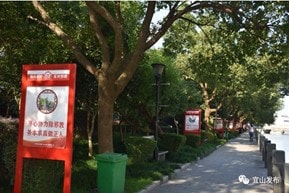
Yishan Town Anti-Xie Jiao Recreational Park (Source: Cangnan Tishan)

Liuhe District Anti-Xie Jiao Recreational Park. (Source: China Anti-Xie Jiao Network)
"Rule of Law" As An Antidote For Xie Jiao
In conjunction with anti-xie jiao messaging, the park aims to extol the virtues of the "Rule of Law," a buzzword that Xi Jinping has been using since consolidating his power before the 19th Party Congress.[18] The real meaning of the phrase "Rule of Law" in this context could be described as: Xi's ambitions to shape a socialist legal system with Chinese characteristics subordinate to the CCP.[19]
A November 2020 conference headed by Xi Jinping and top CCP cadres marked the elevation of "Xi Jinping Thought on the Rule of Law" as the guiding thought for law-based governance in China.[20] The conference came amidst a coordinated campaign by the Chinese state media in the past few months to promote "Xi Jinping Thought on the Rule of Law," with the goal of "strengthening the CCP leadership"[21] as part of the "new development blueprint drawn up by the Party leadership for the country's march toward modernization."[22]
The Chinese concept of 法制 (fǎzhì or "Rule by/of Law")[23] differs substantially from its conventional understanding in the West.[24] In the liberal tradition, "rule of law" includes the formation of independent instruments for checks and balances on the power of government. Conversely, the Chinese approximation of this concept conceives of these instruments as tools of the CCP. The Global Times articulated this best in its assertion that "the rule of law should only be advanced by the rule of the Party."[25] As such, the rule of the law may also be used as a rhetorical tool to legitimize the Party's rule by restating its will through seemingly neutral legal language.[26]

A banner reads: "Advocate Science, Care for Family, Cherish Life, Oppose Xie Jiao" (Source: shy.gov.cn)
Within the broader context of measures to clamp-down on xie jiao observance in China, the "Rule of Law" is venerated[27] as the antidote to alleged social and cultural harms caused by these groups. As reported by the China Anti-Xie Jiao Network on the inauguration of the Qiantang New District recreational park, "education on the rule of law" can be used "against evil" and as a "weapon to safeguard one's rights and a happy life."[28] This choice of rhetoric supports the CCP's narrative that xie jiao pose an existential threat to the society that can only be defeated by the righteous "Rule of Law" and serves to justify the government's crack-down on unauthorised religious communities.

Xuxing Town Anti-Xie Jiao Recreational Park (Source: Jiading.gov.cn)

Beilun District Anti-Xie Jiao Recreational Park (Source: Blnews.cnnb.com.cn)
Definition Of Xie Jiao
Notwithstanding the recent novelty of recreational parks, anti-xie jiao policies and campaigns have been rife in China for several decades. The identification of a group as xie jiao has been updated unsystematically in notes and circulars published by the CCP and the government, and first consolidated in lists since 1995, where at present, there are 37 types, including 24 types of Buddhism and Christian-influenced xie jiao and 13 types of "harmful qigong sects."[29] The list does not include minor xie jiao and it continues to be updated in state pronouncements (for an updated list, see APPENDIX II – List Of Xie Jiao).
Two of the most targeted xie jiao are Falun Gong and the Church of Almighty God, but unregistered house churches, Buddhist congregations, other communities of faith and self-cultivation groups with spiritual undertones are also included in an unfixed government lists and circulars of banned groups.[30]
In official translations, these groups appear as xie jiao[31] and are equated with notorious sects such as the People's Temple or Aum Shinrikyo to show that China has its own xie jiao problem and to legitimize its fight against xie jiao as part of an international endeavor. But most xie jiao are listed not necessarily because they pose a risk to the general public, but more because they present a challenge to the authority of the CCP. In fact, xie jiao can be completely innocuous and therefore should not be associated with xie jiao as understood by Western parliaments.
China Anti-Xie jiao Network, defines xie jiao as follows: "A xie jiao is an illegal organization that is established under the guise of religion, qigong [life-energy cultivation], or other names and deifies its leading members; by means of fabrication and through spreading fallacious heterodox doctrines, it deceives and entraps others, recruits and controls its members and endangers society: most xie jiao spread rumors under the guise of religious doctrines and by promising salvation for mankind; xie jiao usually have a self-proclaimed enlightened leader with supernatural powers who controls the masses in the form of secret societies, generally with the main purpose of collecting money by any means available."[32]
The Chinese Supreme People's Court and Supreme People's Procuratorate in October 1999 listed as follows the criteria to recognize a xie jiao: "Illegal organizations established in the name of religion; qigong; the deification of leaders, creating and distributing superstition and heresy, using methods such as superstition and heresy to confuse and control others, undertaking organized activities that disrupt social order and endanger citizens' lives and property"[33] (see APPENDIX III – Anti-Xie Jiao – QUICK READ! What Are the Xie Jiao's Brainwashing Methods? – Gangnan District People's Court; October 16, 2020).
China's Persecution Of Faith Communities
Following the coordinated suppression of the Falun Gong in 1999, the Standing Committee of the National People's Congress (NPC) issued an anti-xie jiao law,[34] and the Public Security Bureau established the Anti-Xie Jiao Organization, an extrajudicial security force unofficially named "610 Office," after its creation date on June 10, 1999. In 2001, a national Anti-Xie Jiao Association convened for the first time to discuss better ways to differentiate between illegal groups and those recognized by the state and are therefore protected by the PRC constitution.[35]
Being active in a xie jiao or possessing prohibited religious texts are punishable under Article 300 of the Chinese Criminal Code and may be sentenced to three to seven years in prison.[36] Possession of xie jiao literature may be regarded as sufficient for sentencing under Article 300.[37]Anti-xie jiao measures were primarily coordinated by the "Central Leading Group on Preventing and Dealing with Xie Jiao,"[38] however its functions were absorbed by the Anti-Xie Jiao Bureau of the Ministry of Public Security in 2018.[39] The Ministry was established in 1999 to coordinate antireligious campaigns targeting Falun Gong.[40]
The Chinese government adheres to a policy of state atheism and CCP members are prohibited from practicing any religion while in the CCP,[41] but recognizes five major religions practised in China: Buddhism, Taoism, Islam, Catholicism, and Protestantism.[42] Despite its suffix and its contested status among scholars over the years, Confucianism is generally not considered a religion, but rather a secular moral theory.[43]
State-approved religious organizations that are loyal to the CCP are allowed to operate openly in China including: the Buddhist Association of China, the Taoist Association of China, the Islamic Association of China, the Chinese Patriotic Catholic Association, the Chinese Catholic Bishops' College, the Three-Self Patriotic Movement Committee of the Protestant Churches of China, and the China Christian Council.[48] New congregations are required to register with the State Administration for Religious Affairs (SARA) and provincial level Religious Affairs Bureaus.[49]
There is a grey area in which small unrecognized groups, such as Mormons or house churches, are tolerated, but do not enjoy the same rights as their peers and can also be persecuted if they attract too much attention or "subvert state power" as was the case with the arrest of 100 Early Rain Covenant members and their charismatic pastor since 2018.
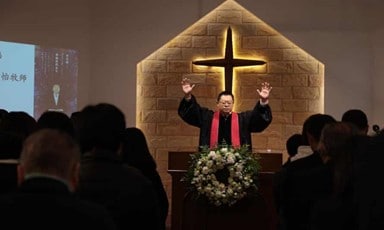
Wang Yi, leader of the Early Rain Covenant church (Source: Facebook)
Attempts to eradicate xie jiao and "extricate" its followers have intensified under the Xi Jinping administration since 2013, as can be seen in the proliferation of the "rule of law and anti-xie jiao recreational parks" and propaganda campaigns.[50] In tandem, numerous reports have documented the tightening grip of religious affairs, most notably the crackdown against Muslims in Xinjiang over the past four years, where more than a million Uighurs have been detained in concentration camps.
Judaism in China is a particular case that occasionally draws the attention of foreign media. While Jews came to China as early as the Tang dynasty (618-907), religious restrictions on assimilation and proselytizing, as well as strict rules for conversions of non-Jews meant that, unlike Islam and Christianity, Judaism never flourished in China. Among the scattered Chinese-assimilated Jewish communities, only a few hundred descendants of the Jews of Kaifeng, Henan Province, have shown a modest resurgence of interest in their religious heritage in the last 30 years.[51] The Chinese government officially recognizes 56 ethnic groups in China, and despite not being a xie jiao, but a well-formed religion and ethnic identity, and having a 1,000-year of history in China, the Chinese-Jewish community was not recognized as China's 57th ethnic group.
Although foreign Jews are free to practice and congregate throughout China – as long as they do not invite Chinese citizens to join them – under Xi Jinping's administration, members of the Kaifeng community have been subjected to increasing levels of surveillance. Interrogations have become more frequent, and religious gatherings have been arbitrarily banned. The official narrative holds that Chinese Jews have been fully assimilated and Sinicized, and therefore are not, in fact, Jewish: "Throughout the history of the world, the Jews have tenaciously maintained their ethnic independence and have hardly been integrated by other ethnic groups, the only exception being the Kaifeng Jewish community."[52]
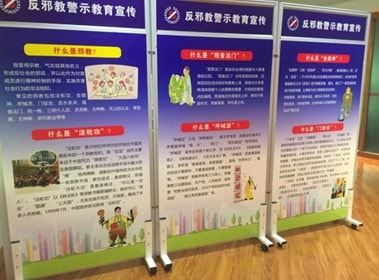
Posters Explaining Five Different Xie Jiao specifically Falun Gong, Guanyin Method, the Shouters, the Church of Almighty God, and the Disciple Society (Source: China Anti-Xie Jiao Network)
Antireligious Persecution Goes Online
In 2017, China's State Council launched a dedicated digital propaganda platform, "The China Anti-Xie Jiao Network,"[53][54] aimed at streamlining the reporting of xie jiao activities, providing psychological guidance for xie jiao practitioners and their families, and combating xie jiao activities online.[55] The Network is especially active in producing and disseminating digital propaganda designed for children. Recent materials targeting children include an animated video entitled "Little Rabbit's Experience Of Being Deceived By Xie Jiao,"[56] a series of "Questions and Answers" sessions between a teacher and student,[57] and the "Xie Jiao Free Classroom"[58] cartoon series.

(Source: China Anti-Xie jiao Network)

(Source: see MEMRI Special Dispatch No. 8576, China Targets Xie Jiao Through Children's Cartoon, December 22, 2020).

(Source: see MEMRI Special Dispatch No. 8576, China Targets Xie Jiao Through Children's Cartoon, December 22, 2020).

(Source: see MEMRI Special Dispatch No. 8576, China Targets Xie Jiao Through Children's Cartoon, December 22, 2020).
CCP anti-xie jiao campaigns have also targeted families. A painting exhibition housed at the Liuhe District anti-xie jiao recreational park displayed nearly 200 similarly recreational paintings produced by local farmers.[59] Many of the paintings depicted scenes of families joyously receiving anti-xie jiao propaganda, learning how to prevent "evil knowledge" from entering the family, or dispelling xie jiao from the household. Chinese families have also been asked to sign "Letters of Family Commitment to Reject Xie Jiao" – a written pledge that a family will "be vigilant, keep their eyes open, and consciously resist the reactionary propaganda and disruptive actions of xie jiao."[60] Through encouraging family members to "remind, supervise, and learn from each other," the CCP intends for families to continue resisting xie jiao influences even in the privacy of the home.[61]

Painting by Farmer Depicts Family Learning How to Prevent "Evil Knowledge" From Entering Into the Family (Source: shy.gov.cn)
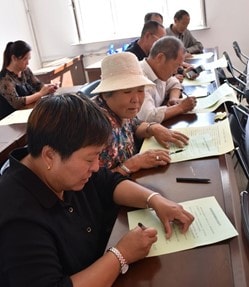
residents of the Shilin community sign "Letters of Family Commitment to Reject Xie Jiao" during "Prevention of Xie Jiao Propaganda Month" (source: Keqi Smart Community via Sohu).
Conclusion
The CCP decision to place propaganda targeting xie jiao in public leisure spaces is deliberate and strategic. Parks are popular recreational venues in China, especially for older citizens, who enjoy socialising and participating in group activities. City parks in China are usually intended for the promotion of leisure time, physical activity, and socializing. By transforming these leisure spaces into propaganda parks, the CCP is attempting to appropriate visitors' leisure time and maximise the visibility of its "Rule of Law" and xie jiao propaganda in highly frequented areas.[62]
Since the 1980s, the rise of religious and quasi-religious groups broke the ideological monopoly of the CCP. In a 2018 white paper, the Chinese government admitted that 200 million of its citizens were committed believers, doubling the number of 100 million in 2009.[63] Suppression of xie jiao has been part of desperate effort by the CCP authorities to gain back ideological dominance. Meanwhile, Chinese citizens are turning to various belief systems, trying to fill a tremendous spiritual void left by the departure of authentic Marxism.
*Heath Sloane is a Research Fellow for the MEMRI Chinese Media Studies Project; Tuvia Gering is a Research Fellow for the MEMRI Chinese Media Studies Project.
APPENDIX I – Another Rule Of Law And Anti-Xie Jiao Recreational Park Was Built In Qiantang New District, Zhejiang Province
"On the afternoon of December 14, the relevant departments of Qiantang New District in Hangzhou, Zhejiang Province, conducted an on-site inspection and acceptance of the construction of the 'Rule of Law and Anti-Xie Jiao' recreational park in the Xinsha community.
"In order to further promote anti-xie jiao propaganda and warning education work, to improve the residents' capabilities against xie jiao, and to combine the rule of law and anti-xie jiao [propaganda] with the construction of a park, the Xinsha community has built a 'rule of law and anti-xie jiao' recreational park in the Blue Lake International Community, so that the residents can enjoy the scenery and be influenced by the rule of law and anti-xie jiao propaganda and education, forming a strong atmosphere of consciously resisting the harm of xie jiao and advocating the rule of law.
"Integrating Parks And Anti-Xie Jiao [Propaganda], Multi-Directional Guidance As One Whole
"Covering an area of 17,000 square meters, the park is one of the main places for recreation and entertainment for residents in the Xinsha community. Since the beginning of this year, Xinsha community has unified planning and overall implementation. It took five months to complete the preparations. With the recreational of 'rule of law and anti-xie jiao,' the park has seven sections, including anti-xie jiao bulletin board, rule of law bulletin board, Party building bulletin board, a bulletin board for the most beautiful (exemplary) people, colour display screens etc.
"On the premise of not affecting the original overall landscape, the anti-xie jiao elements such as billboards, lighting decorations, and large LED screens are integrated into the park landscape, and the anti-xie jiao warning slogans, case studies of xie jiao, knowledge of the rule of law and other publicity content are shaped into a 'landscape' that residents are 'willing to look at and understand.' The park is beautiful and attractive with installations in every corner, leading community residents to stop and watch.
"[The recreational park] incorporates anti-xie jiao common sense and knowledge of the rule of law into the landscape of the park. Under subtle influence, the knowledge of the rule of law and anti-xie jiao is propagandized to residents – exposing the hypocrisy of xie jiao, and using the power of the rule of law to squeeze the breeding ground of the 'xie jiao virus.' [This] strengthens the anti-xie jiao 'antibody,' using the weapon of the rule of law to safeguard one's rights and a happy life, and strengthens one's consciousness and ability to recognize, prevent and resist evil.
"The Combination Of A 'Healthy Heart' And A 'Healthy Body' Sets The Benchmark For Anti-Xie Jiao Propaganda
"Residents imperceptibly receive anti-xie jiao propaganda and education in leisure, entertainment, and exercise activities, so that their thinking will become healthier and they will consciously resist the entrapment and corrosion of xie jiao.
"The park fully embodies the combination of law and anti-evil propaganda with fitness and leisure, and promotes anti-xie jiao propaganda work to penetrate the grass-roots level and integrate into society so as to create a good social governance pattern of co-construction, co-governance and sharing. The completion of the construction of the park will form a large-scale outdoor anti-xie jiao warning education base that will benefit more than 10,000 people.
"'This kind of form is very good, especially for our old people, their daily life is relatively simple, and they seldom have the opportunity to learn. If they come here to exercise every day, they can learn anti xie jiao knowledge by the way. I want to tell my old sisters quickly!' Aunt Yu, who lives in the neighbourhood, said.
"'This kind of form is very good, especially for our elderly people, whose daily lives are relatively simple, and seldom have the opportunity to learn. If they come here to exercise every day, they can learn anti-xie jiao knowledge in passing. I want to tell the old sisters right away!' Aunt Yu from the nearby community said.
"'In our life, we really don't know that there are so many xie jiao. They cheat people by various means and you will fall into a pit of fire if you are not careful. You have to have a good look at these things and let yourself broaden your horizons. Don't be fooled by xie jiao, let alone break the law,' Ms. Liu, a resident who woke up early to exercise, said with emotion.
"It is reported that in recent years, Hangzhou Qiantang new area has built more than ten municipal anti-xie jiao warning education positions, covering all streets in the area, playing a unique role in anti-xie jiao propaganda and education, and creating a strong anti-xie jiao social atmosphere. It has met the needs of residents for anti-xie jiao knowledge, deterred xie jiao organizations, squeezed the space for xie jiao organizations to survive, and achieved great social effects."[64]
APPENDIX II – List Of Xie Jiao
The following list of xie jiao is based on an updated list that has been circulating in online forums and government websites.[65] It includes 24 types of xie jiao and 13 types of "harmful qigong organizations."[66]
- The 24 Types Of Xie Jiao Organizations:
|
# |
English Name |
Chinese Name |
Other Names |
Classified as Imported |
Classified as Buddhist Imposters |
Classified as Christian Imposters |
|
1 |
Falun Gong |
法轮功 |
|
|
- |
- |
|
2 |
Church of Almighty God |
全能神教会 |
Eastern Lightning (东方闪电, dongfang shandìan)/True God (实际神, shijishen)/New Master of Power (新能力主, xinnengliìzhu) |
V |
|
V |
|
3 |
The Shouters |
呼喊派 |
|
V |
|
V |
|
4 |
The Disciple Society |
门徒会 |
|
|
|
V |
|
5 |
Evangelical Mission of the Blood, Water and Spirit of Jesus Christ |
耶稣基督血水圣灵全备福音布道团 |
Bloody Holy Spirit |
V |
|
V |
|
6 |
Full Scope Church |
全范围教会 |
Wailing Rebirth; The Repentance Faction |
|
|
V |
|
7 |
The Lingling Sect |
灵灵教 |
|
|
|
V |
|
8 |
New Testament Church |
新约教会 |
|
V |
|
V |
|
9 |
Guanyin Method |
观音法门 |
The Meditation Society |
V |
V |
|
|
10 |
The Unification Church |
统一教 |
|
V |
|
V |
|
11 |
The Anointed King |
被立王 |
|
|
|
V |
|
12 |
Three Grades of Servant Church |
三班仆人派 |
|
|
|
V |
|
13 |
True Buddha School |
灵仙真佛宗 |
|
V |
V |
|
|
14 |
Children of God |
天父的儿女 |
The Family International |
V |
|
V |
|
15 |
Dami Mission |
达米宣教会 |
|
V |
|
V |
|
16 |
Lord God Sect |
主神教 |
|
|
|
V |
|
17 |
World Elijah Gospel Mission Society |
世界以利亚福音宣教会 |
World Mission Society Church of God |
V |
|
V |
|
18 |
South China Church |
华南教会 |
|
|
|
V |
|
19 |
Teachings of Changshou |
常受教 |
|
V |
|
V |
|
20 |
Capable Master |
能力主 |
|
V |
|
V |
|
21 |
Perfect and Sudden Enlightment Method |
圆顿法门 |
|
V |
V |
|
|
22 |
Mainland China Administrative Deacon Station |
中华大陆行政执事站 |
|
V |
|
V |
|
23 |
Huazang Clan |
华藏宗门 |
|
|
V |
|
|
24 |
The Galactic Federation |
银河联邦 |
|
|
|
V |
- The 13 Types of "Harmful Qigong Organizations":
|
# |
English Name |
Chinese Name |
|
1 |
China Health Care and Wisdom Enhancement Practice (Zhong Gong) |
中华养生益智功 |
|
2 |
Fragrant Gong |
香功 |
|
3 |
Bodhi's Teachings |
菩提功 |
|
4 |
Yuanji Gong |
元极功 |
|
5 |
China Kunlun Goddess Gong |
中华昆仑女神功 |
|
6 |
Special Abilities of Humanity and the Cosmos Gong |
人宇特能功 |
|
7 |
Three-Three-Nine Ascending the Origin Gong |
三三九乘元功 |
|
8 |
Sun and Moon Gong |
日月气功 |
|
9 |
Ten-Thousand Methods for Returning to the Origin Gong |
万法归一功 |
|
10 |
Compassionate Gong |
慈悲功 |
|
11 |
Shen Chang's Human Body Technology |
沈昌人体科技 |
|
12 |
Yitong Health Method |
一通健康法 |
|
13 |
Chinese Natural Special Ability Gong |
中国自然特异功 |
APPENDIX III – Anti-Xie Jiao – QUICK READ! What Are The Xie Jiao's Brainwashing Methods? – Gangnan District People's Court
On October 16, 2020, the WeChat account of the Gangnan District People's Court in Guigang City, Guangxi Province, posted a guide on xie jiao and the four methods they use to "brainwash and control" their followers. This post was originally published by the Public Security Department of Xining, the capital of Qinghai Province.
Following is a translation of the guide:
"Anti-Xie Jiao – QUICK READ! What Are The Xie Jiao's Brainwashing Methods?
"Why people are deluded into joining and serving xie jiao?
"Generally speaking, brainwashing and control of xie jiao followers is carried out on four dimensions: behavioral, informational, mental, and emotional.
"If we draw a comparison between xie jiao and orthodox religions, while the latter has a complete ideological and theoretical set of beliefs, the former only offers a heap of fallacious heterodox doctrines.
"The Supreme People's Court and the Supreme People's Procuratorate of China clearly defined xie jiao organizations in the 'Interpretation of the Supreme People's Court and the Supreme People's Prosecutorial on the Concrete Application of Law on Handling the Cases of Committing Crimes by Organizing and Using Xie Jiao Organizations' adopted in October 1999, which clarified the five characteristics of xie jiao organizations:
"(1) Illegal organizations established under the guise of religion, Qigong, etc;
"(2) Deification of leading members;
"(3) Fabrication and distribution of superstitious heterodoxy;
"(4) The use of superstitious heterodoxies and other means to confuse and deceive others, and recruit and control members;
"(5) Engaging in organized activities that disrupt social order and endanger the lives and property of citizens. In essence, xie jiao are anti-human, anti-science, and anti-social.
"The beliefs of xie jiao are erroneously flawed, so why do even normal people, and people who originally held orthodox religious beliefs, fall under their spell and become involved in xie jiao and serve them?
"In fact, it is also possible for a xie jiao to establish a relationship with the deceived person before passing on the xie jiao theory to the deceived; this is what makes xie jiao so scary, they skillfully brainwash their followers to achieve their goals.
"The result of brainwashing is that the manipulated person's mind (spirit) is completely controlled and even begins to behave abnormally. Generally speaking, brainwashing and control of xie jiao followers is carried out on four dimensions: behavioral, informational, mental, and emotional.
- Behavioral Control
"Xie jiao brainwashing begins with controlling the behavior of its followers in seven specific ways:
1. "Controlling the daily lives of each individual;
2. "Spending a lot of time instilling faith activities and organizing rituals;
3. "Having the right to intervene in major decisions made by followers;
4. "Controlling the thoughts, feelings and activities of followers;
5. "Implementing a system of rewards and punishments;
6. "Eliminating individualism in favor of 'group thinking' which overrides everything;
7. "Formulating strict rules and regulations.
"Behavior is a concrete manifestation of human thoughts, and controlling behavior is equivalent to controlling thoughts and actions, and the 'Three Views'[67] will also change with it. Thought control is one of the customary methods of brainwashing by xie jiao: 'Xie Jiao organizations love to push their members until their conduct is overwhelmed. When followers do not have rituals or missionary activities to attend, they must receive other work in order to confine their time and actions.'
- Informational Control
"The second method of xie jiao brainwashing is to gain control of information. When information is controlled, people's thoughts and perceptions are biased, and they are more susceptible to making big mistakes. There are six broad aspects of information control by xie jiao:
1. Fraud;
-
"Deliberately concealing information;
-
"Distorting information to make it more 'palatable';
-
"Outright lying.
2. "Reduce or eliminate access to non-religious sources of information.
3. "Divide the information flow so that there is a difference between inside and outside sources.
-
"Information cannot be disseminated freely.
-
"Intelligence is broken down into small bits, with different people at different levels and with different responsibilities getting different information.
4. "Encourage congregants to secretly spy on each other.
5. "Wide use of information disseminated by xie jiao organizations to carry out propaganda campaigns.
-
"Newsletters, magazines, journals, audio tapes, video tapes, other media,
-
"Falsely quoting non-xie jiao sources and abusing their statements.
6. "Unethical use of confessions.
-
"The use of 'sins' to completely deny the boundaries of individuality.
-
"The use of old 'sins' for the purpose of manipulation and control, without forgiveness and without atonement;
-
"Submission and dependence are indispensable.
"Xie jiao organizers do not tell their followers about themselves. In the early stages, they do not even tell them about the specific beliefs of their group, yet they want to know all the information about them. Moreover, xie jiao organizers are good at using information warfare to control their members and to promote the cause of the group. Legitimate organizations allow people to think freely, read freely, talk freely, and make their own decisions; destructive mind control always tries to replace the believers' thinking.
Mental Control
"The third way of xie jiao brainwashing is to adopt mind control, which is the core of xie jiao spiritual control and comprises eight aspects:
1. "Making followers accept the doctrine of the organization as 'the absolute truth' from the bottom of their hearts;
2. "Using 'deceptive' language; the 'special' language of the xie jiao does not expand understanding but limits it, to the point that people stop thinking altogether.
3. "Only 'good' and 'proper' thinking is encouraged.
4. "Using hypnosis to reduce alterations in one's mental state.
5. "Manipulating memories of past events and transplanting false memories.
6. "Preventing independent thinking and eliminating negative thoughts.
7. "Opposing rationalized analysis, critical thinking and promoting destructive criticism; criticism of an organization's teachings, doctrines, or policies are illegal.
8. "Any other belief system is unlawful, no good, and harmful.
"The purpose of xie jiao mind control is to make people abandon their social system, ignore themselves, instill a 'black and white' thinking, and obey the leader; once the leader gives an order – as long as the goal is right, the end justifies the means. Once a xie jiao finds that its members are thinking 'beyond' the organization's doctrine and ideas, it will assume that the person is spiritually 'demonized' and that his or her spiritual life is under the attack and control of evil spirits. It often uses so-called 'prayers' or even flogging and beating to exorcise the demons, ultimately damaging them physically and mentally.
4. Emotional Control
"The fourth way a xie jiao uses brainwashing is through emotional control. Human beings are created with feelings, and if they are controlled, they can have negative, even life-threatening implications for themselves and others. There are seven aspects of emotional control in brainwashing by xie jiao:
1. "Controlling and shrinking the individual's emotional environment;
2. "Making the individual feel that problems are his or her own doing, and never the fault of the leader or the organization.
3. "Making extensive use of the 'sense of guilt.'
4. "Making extensive use of the 'sense of fear.'
5. "Controlling the limits of emotional ebb and flow.
6. "Making frequent group confessions in ceremonies or public places.
7. "Instilling fear.
"Those who leave the xie jiao are denounced as 'weak,' 'undisciplined,' 'unspiritual,' 'worldly,' 'brainwashed,' or lured [back in] by money, sex, or rock music.
"The emotional control of a xie jiao means that members cannot have their own feelings or personal likes and dislikes, but can only follow the preferences of their leader. It takes a toll on their thoughts, will, emotions and behavior until they become out of touch with real life. The emotional control of the xie jiao causes people to lose the self and become like a wooden manikin or a dummy.
"In addition to the control dimensions listed above, xie jiao often control (confine) their followers' environment and speech, urging them to accept its teachings, live according to its beliefs and follow its 'precepts' lest they be suppressed, cursed and punished. Once a xie jiao follower is brainwashed, no matter how smart and normal a person is, he or she will not know right from wrong and become oblivious to the truth." [68]
[1] There is a debate about the translation of xie jiao. In the website Bitter Winters, renowned Italian sociologist of religion Massimo Introvigne suggests that the translation of the term, xie jiao, which has been used since the late Ming era, should be rendered as "heterodox teachings," rather than "evil cults," as it often is. Introvigne writes: "(邪教). 'Often incorrectly translated as "evil cults," the expression xie jiao, which has been used since the late Ming dynasty (1368-1644), means "heterodox teachings" and indicates the religious movements included in the list of the xie jiao, which the government regards as hostile to the CCP, dangerous, and not "really" religious. Xie jiao are prohibited, constitute the black market of Chinese religion, and being active in a xie jiao is punished with severe jail penalties under Article 300." However, Emeritus Professor in the Department of Asian Studies and the Centre for Chinese Research at the University of British Columbia Daniel L. Overmyer contended that even though the term has been translated as "heterodox teachings" in other periods of Chinese history, in the 21st century the notion of "evil cults" has been increasingly used as the official translation. Bitterwinter.org/Vocabulary/xie-jiao; Religion in China Today, Edited by Daniel L. Overmyer, The China Quarterly Special Issues New Series, No.3, Cambridge University Press, 2003, p. 204.
[2] Chinafxj.cn/c/2020-12-17/1313418.shtml, December 17, 2020.
[3] Under Mao's reign, especially during the Cultural Revolution, religion was practically banned. For ten years, from 1966 to 1976, all churches and temples were shut down, except a handful which meant to be showcases to foreigners.
[4] Orlir.org/wp-content/uploads/2018/02/tjoc_2_1_3_irons.pdf; Edward A. Irons, The list: the evolution of China's list of illegal and evil cults. The Journal of CESNUR, 2(1), 33-57, 2018.
[5] Chinafxj.cn/c/2020-12-17/1313418.shtml, December 17, 2020.
[6] Chinafxj.cn/c/2020-12-17/1313418.shtml, December 17, 2020.
[7] Chinafxj.cn/c/2020-12-17/1313418.shtml, December 17, 2020.
[8] Blnews.cnnb.com.cn/system/2014/06/13/010979230.shtml, June 13, 2014.
[9] Ajnews.zjol.com.cn/ajnews/system/2015/05/20/019347347.shtml, May 20, 2015.
[10] News.yuanlin.com/detail/20161219/247994.htm, December 19, 2016.
[11] Scnews.newssc.org/system/20170425/000772707.html, April 25, 2017; News.66wz.com/system/2017/05/19/104993617.shtml, May 19, 2017;
Liaoning.nen.com.cn/system/2017/11/27/020215291.shtml, November 17, 2017;
News.sq1996.com/sqyw/2017/1226/236149.shtml, December 26, 2017;
Cmstop.cms.cnxz.com.cn/p/5813.html, December 28, 2017.
[12] Sohu.com/a/220022740_148698, January 31, 2018;
Liaoning.nen.com.cn/system/2018/02/27/020386080.shtml, February 27, 2018;
Cq.cqnews.net/cqztlm/2018-03/26/content_44024930.htm, March 26, 2018;
Liaoning.nen.com.cn/system/2018/04/12/020462027.shtml, April 12, 2018;
Liaoning.nen.com.cn/system/2018/05/17/020510418.shtml, May 17, 2018;
Static.nfapp.southcn.com/content/201805/24/c1195118.html, May 24, 2018;
Cq.cqnews.net/cqztlm/2018-05/29/content_44389769.htm, May 29, 2018;
News.sina.com.cn/s/2018-07-20/doc-ihfqtahh7376421.shtml, July 20, 2018;
Legaldaily.com.cn/locality/content/2018-11/14/content_7693763.htm, November 14, 2018;
Fs.wenming.cn/wqcw/201811/t20181127_5566206.shtml, November 27, 2018;
Pazjw.gov.cn/pinganjianying/201811/t20181129_8870344.shtml, November 29, 2018.
[13] Static.nfapp.southcn.com/content/201903/04/c1973351.html?colID=7159&from=groupmessage, March 4, 2019;
Meizhou.cn/2019/0613/588149.shtml, June 13, 2019;
Sichuanpeace.gov.cn/sfzxdt/20190722/1897534.html, July 22, 2019.
Frjs.jschina.com.cn/31017/31018/201910/t20191015_6367261.shtml, October 15, 2019;
[14] Chinafxj.cn/c/2020-06-29/1219681.shtml, June 29, 2020;
Gxxw.zjol.com.cn/gxxw/system/2020/10/20/032771870.shtml; October 20, 2020;
Baijiahao.baidu.com/s?id=1682329537890688576&wfr=spider&for=pc, November 3, 2020;
Fzahw.com/index.php?m=content&c=index&a=show&catid=331&id=81939, November 24, 2020.
[15] Chinafxj.cn/c/2020-12-17/1313418.shtml, December 17, 2020;
[16] Ent20606723www.shy.gov.cn/info/1065/12974.htm, March 26, 2018.
[17] 720yun.com/t/c032cwadxew?scene_id=59444
[18] Xinhuanet.com/english/2020-12/10/c_139578646.htm, December 10, 2020.
[19] En.people.cn/n/2014/1017/c90785-8796233.html; There are two terms, which are pronounced exactly the same but with different meanings: 法制 and 法治 (Rule of law and rule by law). The Chinese often treat them as exchangeable terms.
[20] Xinhuanet.com/english/2020-12/10/c_139578732.htm
[21] Iolaw.org.cn/showArticle.aspx?id=4194
[22] En.moj.gov.cn/2020-11/19/c_564981.htm
[23] Article 1 of the Chinese Legislation Law of March 15, 2000, reveals the state of the system, with very interesting references in the same provision to a socialist legal system "with Chinese characteristics;" to ruling the country "through (by) law"; and to the concept of "socialist rule of law." This single provision, then, is ambiguous and flexible enough to justify both a rule by law and a (socialist) rule of law reading. Digitalcommons.law.ggu.edu/cgi/viewcontent.cgi?article=1112&context=annlsurvey
[24] Un.org/ruleoflaw/what-is-the-rule-of-law
[25] En.people.cn/n/2014/1017/c90785-8796233.html
[26] Justsecurity.org/58544/china-rule-law-cautionary-tale-international-community/
[27] Chinafxj.cn/c/2020-12-17/1313418.shtml, December 17, 2020.
[28] Chinafxj.cn/c/2020-12-17/1313418.shtml
[29] Czcaw.gov.cn/info.asp?id=4787.
[30] Orlir.org/wp-content/uploads/2018/02/tjoc_2_1_3_irons.pdf; Edward A. Irons, The list: the evolution of China's list of illegal and evil cults. The Journal of CESNUR, 2(1), 33-57, 2018.
[31] Chinaconsulate.org.nz/eng/zt/flgzt/t44074.htm, November 19, 2003.
[32] Chinafxj.cn
[33] Mp.weixin.qq.com/s?__biz=MzA5MTg0NjI2OA==&mid=2651986512&idx=3&sn=b99080a5d06992a0bc53769d8ac3259b&chksm=8b909943bce71055295361389f6061d3b633428676c6d200c82905b6fe3f6d852c6d8e4df2e3#rd, October 16, 2020.
[34] Shantou.gov.cn/sfj/qwpfzt/qwpfzt/flfg/content/post_1767688.html, June 12, 2020.
[35] China.org.cn/english/23958.htm, December 20, 2001.
[36] Article 300: "Article 300 Whoever forms or uses superstitious sects or secret societies or cult organizations or uses superstition to undermine the implementation of the laws and administrative rules and regulations of the state shall be sentenced to fixed-term imprisonment of not less than three years but not more than seven years and concurrently sentenced to a fine; if the circumstances are especially serious, he shall be sentenced to fixed-term imprisonment of not less than seven years or life imprisonment and concurrently sentenced to a fine or confiscation of property; if the circumstances are minor, he shall be sentenced to fixed-term imprisonment of not more than three years, criminal detention, public surveillance or deprivation of political rights and concurrently or separately sentenced to a fine." Amendment IX to the PRC Criminal Law (adopted by the National People's Congress Standing Committee (NPCSC) on Aug. 29, 2015) § 33, npc.gov.cn/npc/xinwen/2015-08/31/content_1945587.htm. A report for the US Department of Justice specified that, in 2017, China's Supreme People's Court and Supreme People's Procuratorate jointly issued a judicial interpretation on the crime of "organizing and using cult organizations to obstruct the enforcement of laws." "Cult organizations" are described by the judicial interpretation as follows: "[S]uch organizations are established under the disguise of religion, qigong or other names; such organizations deify or engage in advocacy propagandas of their ringleaders; and, such organizations enchant or deceive others, develop and control members, and cause social harm by producing or disseminating superstitions and heresies or by other means." Organizing or inciting others to engage in "cult" activities or using "cults" or the "guise of religion" to disturb social order or to harm others' health is subject to public security penalties, which includes a detention of up to fifteen days, according to article 27 of the PRC Law on Penalties for Administration of Public Security:
Article 27: "A person who commits one of the following acts shall be detained for not less than 10 days but not more than 15 days and may, in addition, be fined not more than 1,000 yuan; and if the circumstances are relatively minor, he shall be detained for not less than 5 days but not more than 10 days and may, in addition, be fined not more than 500 yuan: (1) organizing, instigating, coercing, inducing or inciting another person to engage in activities of cults, superstitious sects, or secret societies, or making use of cults, superstitious sects, secret societies, or superstitious activities to disturb social order and harm the health of another people; or (2) disturbing social order and harming the health of another person by masquerading under the name of religion or qigong." justice.gov/eoir/page/file/1068681/download, June 2018.
[37] Bitterwinter.org/Vocabulary/article-300/
[38] Bitterwinter.org/changes-in-the-structures-for-fighting-xie-jiao, February 24, 2019.
[39] Singtaousa.com/%E6%97%A5%E5%A0%B1/%E5%9C%8B%E9%9A%9B/553822-%E9%98%B2%E9%82%AA%E8%BE%A6%E3%80%8C%E5%A3%BD%E7%B5%82%E6%AD%A3%E5%AF%A2%E3%80%8, March 22, 2018.
[40] Faluninfo.net/falun-gong-timeline/
[41] Globaltimes.cn/content/905305.shtml, February 1, 2015. In 2006, the CCP discipline committee said that over 20 million CCP members participated in religious activities. asianews.it/news-zh/%E5%85%B1%E4%BA%A7%E5%85%9A%E9%99%B7%E5%85%A5%E5%8D%B1%E6%9C%BA%EF%BC%8C%E4%B8%A4%E5%8D%83%E4%B8%87%E5%85%9A%E5%91%98%E5%B9%B2%E9%83%A8%E5%88%B0%E5%9C%A3%E5%A0%82%E5%92%8C%E5%BA%99%E5%AE%87%E5%8F%82%E5%8A%A0%E5%AE%97%E6%95%99%E6%B4%BB%E5%8A%A8-5509.html, February 28, 2006.
[42] China-embassy.org/eng/zt/zjxy/t36492.htm, October 1997.
[43] Sun, A. (2013). Confucianism as a world religion: Contested histories and contemporary realities. Princeton University Press.
[48] China-embassy.org/eng/zt/zjxy/t36492.htm, October 1997.
[49] Forum for Religious Freedom Europe, October 15, 2018. Retrieved from: foref-europe.org/blog/2018/10/15/chinas-blacklist-of-forbidden-religions/
[50] Eber, I. (2015). Chinese Jews and Jews in China: Kaifeng – Shanghai. In Deeg M. & Scheid B. (Eds.), Religion in China: Major Concepts and Minority Positions (pp. 65-90). Wien: Austrian Academy of Sciences Press. doi:10.2307/j.ctt1vw0pdc.10
[51] Henan Daily, December 16, 2014. Retrieved from: Henandaily.cn/2014/12-16/103935754.html
[52] "The China Anti-Cult Network" website was launched on September 2017 and operated by the Earth and Sunshine Cultural Development Center under the Ministry of Public Security of the People's Republic of China, chinafxj.cn/
[53] It is worth noticing that online religious activities are rapidly increasing in China. The Chinese authorities said there are more than 300,000 websites promoting religion in China. Sara.gov.cn/zjyj/330025.jhtml, April 3, 2020.
[54] Xinhuanet.com/english/2017-09/22/c_136629955.htm, September 22, 2017.
[55] See MEMRI Special Dispatch No. 8576, China Targets "Cults" Through Children's Cartoon, December 22, 2020
[56] Chinafxj.cn/c/2020-10-26/1284032.shtml, October 26, 2020.
[57] Chinafxj.cn/c/2020-05-29/1127984.shtml, May 29, 2020.
[58] Ent20606723www.shy.gov.cn/info/1065/12974.htm
[59] Sohu.com/a/342235273_744711
[60] Sohu.com/a/342235273_744711
[61] Chinafxj.cn/c/2020-12-17/1313418.shtml,
[62] Chinanews.com/gn/2018/04-03/8482951.shtml, April 3, 2018.
[63] Chinafxj.cn/c/2020-12-17/1313418.shtml, December 17, 2020.
[64] Czcaw.gov.cn/info.asp?id=4787
[65] For more information on some of the groups and a breakdown of their religious affiliation see: Otehode, U., & Penny, B. (2021). Tension Between the Chinese Government and Transnational Qigong Groups. In N. Cao, G. Giordan, & F. Yang, Chinese Religions Going Global – Volume 11 (pp. 194-209). Boston: Brill. For more information on some of the groups and a breakdown of their religious affiliation see: Forum for Religious Freedom Europe, October 15, 2018. Retrieved from: Foref-europe.org/blog/2018/10/15/chinas-blacklist-of-forbidden-religions/.
[66] The "Three Views" is a neologism coined by former General Secretary Hu Jintao, first presented at the Third Plenary Session of the 17th Central Commission for Discipline Inspection (CCDI), the internal anti-corruption body of the CCP, in 2009. Addressing party cadres to maintain their integrity and fight corruption, Hu called for adherence to "correct views" of one's career, work and political achievements.
[67] Mp.weixin.qq.com/s?__biz=MzA5MTg0NjI2OA==&mid=2651986512&idx=3&sn=b99080a5d06992a0bc53769d8ac3259b&chksm=8b909943bce71055295361389f6061d3b633428676c6d200c82905b6fe3f6d852c6d8e4df2e3#rd, October 16, 2020




